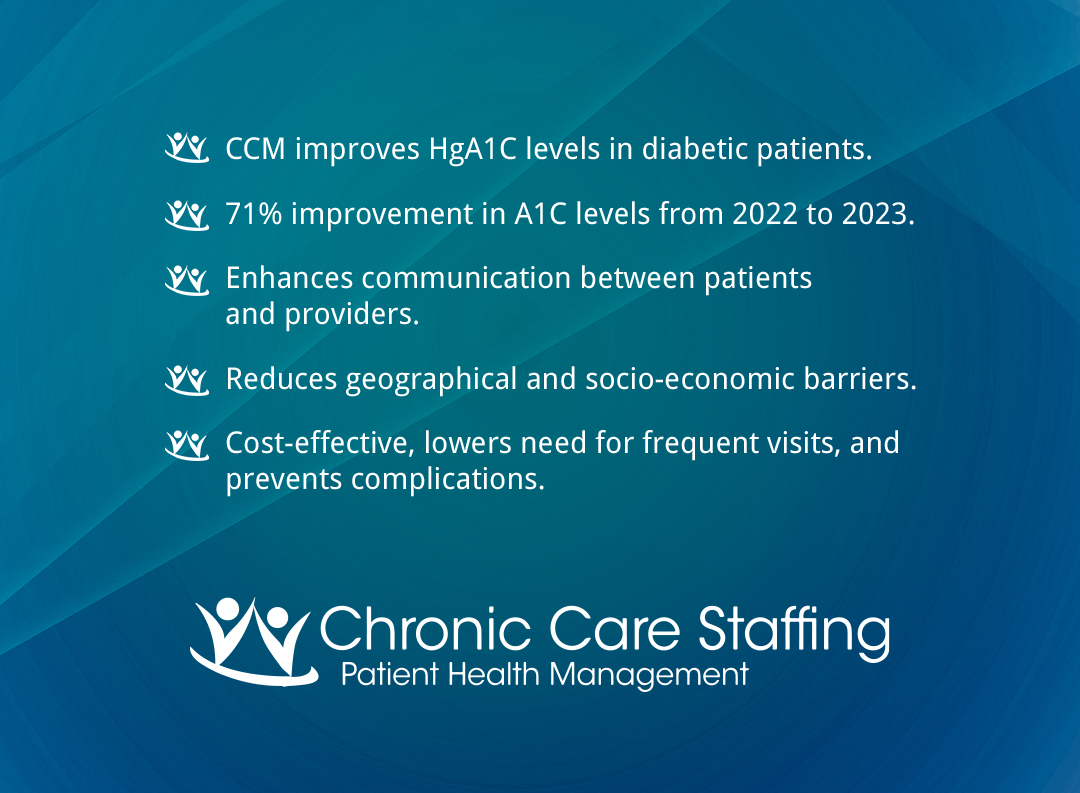Story by Connor Danielowski / June 14, 2024

A Case Study completed by Chronic Care Staffing for a current client demonstrates how clinically based Chronic Care Management (CCM) drives improvements in key quality metrics, such as HgA1C levels, for Medicare patients diagnosed with diabetes.
Diabetes necessitates constant monitoring and management. Traditionally, this relied on in-person clinic visits, which can be inconvenient and create barriers to consistent care. However, the rise of virtual care services, like Chronic Care Management, offers a promising solution. CCM programs, such as those provided by CCS, leverage key quality metrics to deliver customized virtual clinical care. Our Case Study has shown its effectiveness in improving HgA1C levels—a key indicator of long-term blood sugar control.
The clinical impacts of the Case Study concluded that 71% of patients monitored from 2022 to 2023 experienced lowered A1C levels during that time period. The average HgA1C level decreased from 9.7 to 8.3.
Dr. Thomas, Chief Medical Officer for Dayspring Health, expressed his appreciation for the collaboration with CCS after reviewing the outcomes of their recent case study. He stated, “We are so grateful for our partnership with CCM. Their nurses are truly an extension of our practice but more importantly, gives us the eyes and ears we need to provide customized care for our complex chronic care patients.”
CCM facilitates improved communication between patients and providers. CCM programs allow for monthly check-ins, enabling timely adjustments to medication regimens, dietary advice, or lifestyle recommendations. This continuous dialogue empowers patients to voice concerns and receive personalized support, addressing anxieties and promoting adherence to treatment care plans.
Chronic Care Management also tackles geographical and socio-economic barriers that can hinder access to quality care. In rural areas or for patients with limited mobility, traveling to appointments can be difficult. A CCM program from Chronic Care Staffing eliminates these hurdles by allowing patients to receive care from the comfort of their homes. This increased accessibility is particularly crucial for managing diabetes, a condition that disproportionately affects low-income populations who may struggle with transportation or work schedules.
Beyond accessibility, CCM offers cost-effective solutions for both patients and healthcare systems. CCM reduces the need for frequent in-person visits, minimizing travel expenses for patients and streamlining workflow for clinics. Additionally, early detection and prevention of complications associated with uncontrolled diabetes, such as heart disease and kidney failure, can lead to ER reductions and significant cost savings overall.
In conclusion, a CCM program offers a powerful tool for improving HgA1C levels in diabetes patients. By promoting patient engagement, enhancing communication with providers, increasing access to care, and offering cost-effective solutions, CCM empowers diabetic patients to take control of their health and achieve better long-term outcomes.
To learn more about Chronic Care Staffing’s CCM program and its efficacy in improving HgA1C levels, please contact us to schedule a private consultation.